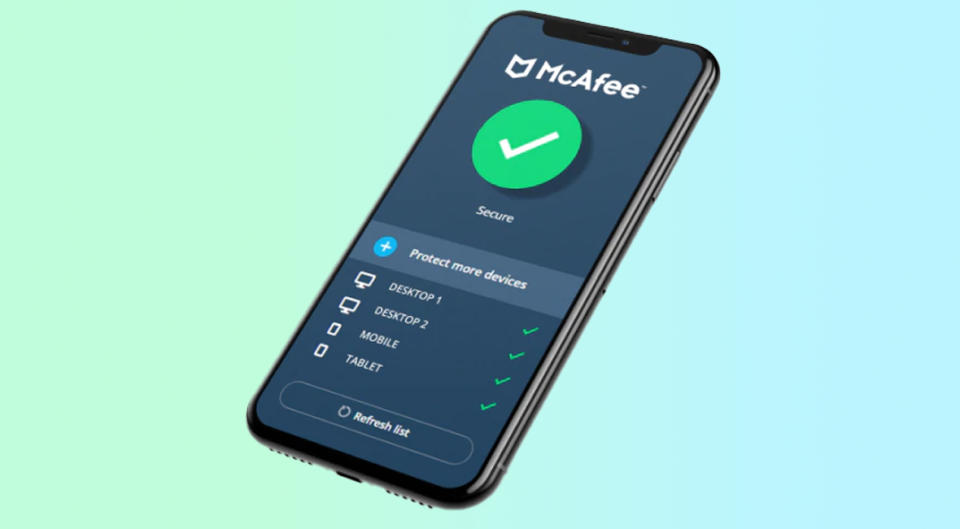Are all those political emails actually spam? Here's how to tell—and avoid a malware invasion
Yahoo Life is committed to finding you the best products at the best prices. The product written about here is offered in affiliation with Yahoo Life's parent company, Verizon Media.

You know that deluge of political emails and texts that’s been flooding your inbox lately? With the election results at the top of everyone’s minds as we check voting results minute-by-minute, Presidential candidates—and their marketing departments—are still vying for a few more eleventh-hour campaign dollars.
The influx can be overwhelming, but that’s not the worst of it. “The truth of the matter is that a lot of those messages are spam,” says Adam Levin, cyber security expert and founder of Cyberscout. And clicking on the wrong link could invite malware or ransomware into your computer or smartphone—with the worst-case scenario being identity theft.
How can you can tell the difference between a legitimate campaign message and malware-laced spam?
As Levin points out, campaign messaging is all part of the electoral process—but election season also creates a fertile space for cyber criminals to disguise themselves as legitimate political organizations reaching out with malware-laced messages. It can be hard to tell the difference. One idea is to hover your mouse over the sender’s email address to spot typos, says Levin, but even that’s not a foolproof way to identify a spoof. So how do you know?
“If I didn't ask you for it, and it shows up in my inbox, as far as I'm concerned, it's spam,” says Levin. Granted, you may have signed up for it, but that doesn’t mean you have to engage with it. “You can read the email and then decide, is this a candidate or a party that I wish to support? If that's the case, then go directly to the website of that candidate or the party itself. Go straight to the source.”
A smart antivirus software package like McAfee Multi Access detects malware attacks before you do

Of course, that takes leg work, and sometimes clicking on a link is just plain easier. That’s why having a rock-solid antivirus program installed on your devices is so crucial. McAfee Multi Access, the leading name in antivirus software, thwarts malware, ransomware, and spyware attacks—even if you’re caught off guard and happen to click where you shouldn’t.
McAfee Multi Access has your whole digital life covered. One subscription protects up to five devices including PCs, Macs, smartphones, and tablets. You can try it free for 30 days—and after that, it’s just $4.99 a month.

The software will scan for anything suspicious, issuing red flags if something you’re about to download seems fishy or a website you’ve landed on looks dangerous. If you happen to lose your phone, it’ll even lock and wipe the device remotely to make sure your identity is never compromised.
Shop it: McAfee Multi Access, 30 days free then $4.99 a month, subscriptions.yahoo.com
And McAfee Multi Access updates automatically, so you never have to worry about out-of-date software. When it comes to online fraud protection, it doesn’t get any better than this—even PCMag.com gave it the Top Product award.
Never unsubscribe from political emails and texts—no matter how many you get

Of course, having such a formidable software “security guard” doesn’t excuse you from practicing safety precautions. In fact, another expert-driven strategy for fielding political messaging and spam seems a little counterintuitive. It has to do with unsubscribing from campaign emails and texts altogether. Never unsubscribe, warns Levin.
“There’s nothing more delicious to a hacker than infecting the unsubscribe button,” he tells Yahoo Life. Although “99.9% of the unsubscribe buttons are legitimate,” it’s still one of the most common places for cyber criminals to plant malware—and as soon as you click, it can trigger an attack. But that doesn’t mean you have to live with an inbox overflowing with unwanted emails and texts.
“There are a lot of extremely legitimate unsubscribe buttons, but you just have to keep in mind the fact that they may not be,” says Levin. “So instead of hitting the unsubscribe button, just block the sender or direct them to your spam folder.”
Bottom line: take the time to make sure the email isn’t malware. Levin cautions against balking at the “extra 30 seconds or a minute” it takes to go straight to the websites of politicians or their parties, or to redirect unwanted senders to spam instead of simply hitting unsubscribe. He calls that small inconvenience “nothing compared to the amount of time that you will be spending sorting out your life from having been hit with ransomware or malware.”
Read more from Yahoo Life:
Follow us on Instagram, Facebook, Twitter, and Pinterest for nonstop inspiration delivered fresh to your feed, every day
Want daily pop culture news delivered to your inbox? Sign up here for Yahoo Entertainment & Lifestyle's newsletter.
